Antonín Dvořák

Born: September 8, 1841, Nelahozeves (near Prague), Czechia (Austrian Empire)
Died: May 1, 1904, Prague, Czechia
Serenade in D minor, Op. 44
- Composed: January 4–18, 1878
- Premiere: November 17, 1878 at the Prague Provisional Theatre conducted by the composer
- Duration: approx. 24 minutes
In contrast to Haydn, Mozart and Beethoven, for whom the serenade was Gebrauchsmusik (“utility music”), when the 19th-century Romantic masters composed in the genre it was out of nostalgia for the classicism of 18th century Vienna. Professed admiration for the balance Mozart and Haydn achieved between light entertainment and “art music” was a sort of homage to “old fashioned” music. Even works that are now cornerstones of the chamber repertoire had disappeared from public awareness and had to be rediscovered by 19th-century wind ensembles.
Young Antonín Dvořák encountered these revived pieces during a visit to Vienna in 1877, where he happened to hear one of Mozart’s wind serenades and was spontaneously prompted to write his own Serenade in D Minor, Op. 44. It serves as the woodwind counterpart to his much more famous string serenade Op. 22, and, like the latter, is intentionally constructed in the classical style. However, Dvořák breathes his own unambiguous Bohemian flavor into the work, blending comedy with sentiment in a way that evokes Rusalka and The Bartered Bride as much as Figaro.
Indeed, Mozart’s presence is felt in the underpinnings of the work: Dvořák bases his choice of instrumentation on Mozart’s Gran Partita: 12 winds plus a foundation of bass. The Czech composer also models the third movement, the Andante con moto, on the Adagio movement from Mozart’s work in homage. The result is a charming concert piece, overflowing with stylized Bohemian dances and dreamy melodies, that belies the circumstances of its creation: Dvořák composed and polished it in just 14 days.
As was common among the serenades of the 18th century, the work opens and closes with marching music. The Minuet is an amalgamation of two Czech peasant dances: both the leisurely sousedská and the racing furiant evince their working-class origins. The following Andante, on the other hand, is sheer elegance and sophistication. Of Dvořák’s many disarming finales, the one heard in this work is among the most magnificent—a folk music furioso that enchants the listener from the first notes of the opening unison to the final, blaring horn fanfares.
—Dr. Scot Buzza